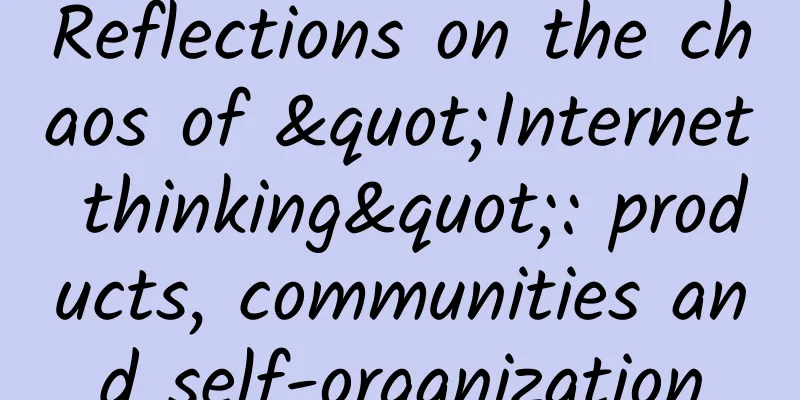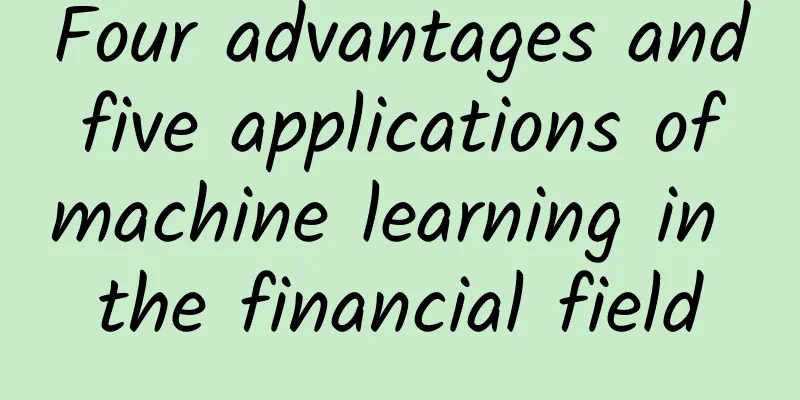Reflections on the chaos of "Internet thinking": products, communities and self-organization

|
The chaos and reasons under the Internet thinking Since the concept of Internet thinking was proposed, the debate surrounding it has never stopped. People can be roughly divided into two camps based on their attitudes towards Internet thinking: one is supportive, and the other is negative. Among the public supporters, there are Li Shanyou and a group of young people from the Innovation Study Society; those who ignore it include Xu Xiaonian, Yang Yuanqing, etc. The supporters basically believe that Internet thinking is a new thing that will completely subvert the existing product operation model; the ignorers believe that this is basically a scam and a waste of time, and the Internet is just a new tool. Among the negators, Xu Xiaonian's view is the most representative. He said: Internet thinking is a very ridiculous term, and I don't quite agree with it. The Internet is one of the many innovations in human history. The first major innovation of mankind is the steam engine, but I have never heard of steam engine thinking. Then came railways and electronics, and there was no mention of thinking. There is no Internet thinking abroad at all. We often fool others and fool ourselves. Furthermore, there are many different opinions among the supporters. Many of them lack a clear definition of the five words "Internet thinking" and are just simple descriptions of the phenomenon. Although there are some golden sentences and flashes of inspiration, they are indeed not substantial enough. Of course, this is just the tip of the iceberg. Similar confrontations are everywhere in various private gatherings. The scope and depth of this debate are actually quite rare. How many people who want to do something today have never heard of this word or considered this word? This reality similar to a chaotic war may be related to the origin of this concept. This concept does not come from academia, nor even from methodological experts, but from many practitioners. Li Shanyou's promotion has given this concept a bit of academic color. But it happens that this is not a simple concept, but something that will reconstruct the form of social existence. It is extremely large and complex, and its impact is far more than just business. To put it in an extreme way, most people who talk about Internet thinking do not actually have the corresponding knowledge reserves to talk about such a complex thing. Lei Jun has the ability to describe his phenomenon and practice it, but he does not have the ability to define it and explore it. This is the difference between thinkers and practitioners. This may be a bit abstract, but we can make some analogies. Recently, I saw Ma Huateng compare the Internet to the third industrial revolution, and relatively more people recognized this person. Then we can extract the events of the magnitude of the third industrial revolution and see which people led the ideas in this magnitude of social change. The earliest leap in human productivity should be the agricultural revolution. At this time, the people who considered the relationship between people and people and between people and production in China were the pre-Qin philosophers; in the first industrial revolution, it was Adam Smith who considered this matter; in the second industrial revolution, it was Marx who systematically considered this, and in terms of management, it was Taylor, Drucker, etc. If the Internet is indeed an industrial revolution, then it will inevitably reconstruct many things, including the relationship between people, the relationship between people and companies, and the relationship between companies. In this way, there will inevitably be thinkers who will re-examine the reality and think about the future. Who has the height and vision of these people at present? From this perspective, the current debate is limited to what the company should do. The story has just begun, and there is still insufficient thinking and investment in Internet thinking. Insufficient investment leads to incomplete research, incomplete research leads to insufficient logic, and insufficient logic leads to all kinds of misunderstandings and noise, and even no real discussion. This may be related to the domestic atmosphere. Doers may not understand methodology, but simply judging heroes by success or failure will inevitably make everyone take it for granted that what doers say is right. But in fact, doers are more suitable for talking about experience, and thinkers are more suitable for grasping the essence and talking about rules. Experience relies on details, cannot be repeated, and can be intuitively referenced, but rules are based on the essence, so they can be studied and learned. If we think deeply, we will find that the Internet tool theory is not inconsistent with the current Internet thinking that is advocated by most people. The Internet is obviously a tool, but when the changes brought about by this tool are enough to change the social form, then corresponding ideas will be derived from this tool. This is not difficult to understand. The tactics of using swords and spears are obviously different from the tactical ideas of using muskets, but for humans, swords, spears and muskets are indeed tools. The person who surprised me most among the negative faction was Xu Xiaonian. As a scholar, his views did not reflect a proper spirit of scholarship. Xiaomi's rapid success and the inability of Alibaba and other Internet companies to list on the A-share market have actually provided strong enough external stimuli. In this case, ignoring or looking for answers in piles of old papers is a bit like the old people of the Qing Dynasty. Imagine, Alibaba is undoubtedly an excellent enterprise, but this kind of enterprise is not compatible with the domestic listing standards. What does this mean? This means that the defined value standards are incompatible with Internet enterprises like Alibaba. Why does this incompatibility occur? Because the Internet has reset the definition of the word value. Isn't this huge change enough to support a new way of thinking? This is too late. So Internet thinking is something that will reconstruct the relationship between people, people and companies, companies and companies, and people and society. Even if it is limited to the scope of the enterprise, it is also something that will have a huge impact on product development and operation models, personnel organization and management models, and even financial systems. In the West, alchemy gave birth to chemistry, but there is no doubt that when chemistry is still in the alchemy stage, it will inevitably be subject to more doubts. This should be the current state of Internet thinking. Further reflection on Internet thinking Even those who oppose Marx admit that his basic logic is impeccable. If the marginal efficiency of a production organization continues to decline, then this organization will inevitably collapse and be replaced by an organization with higher marginal efficiency. A new organizational model always wins because it can greatly improve productivity, and greatly improving productivity undoubtedly depends on the power of technology and the organizational model that cooperates with it. To make the problem a little more vivid, we can abstract an organization into a giant composed of many people, so that we can find that there are four things that must be clarified for it: 1. Why do I need to exist? Behind this is the question of mission. 2. Where should I go? This is a strategic question. 3. How to maximize the power after aggregation? Behind this is the issue of efficiency. 4. How to deal with the relationship with other organizations? This is a public relations issue. Li Shanyou has recently used products, communities and self-organization to explain Internet thinking in a rather innovative way. This explanation basically covers the first, second and third items, but does not talk much about the mission issue. In fact, self-organization, products and communities must be an organic whole and integrated under a certain spirit. This spirit is like the soul of self-organization, products and communities. This is not something high-sounding, but the so-called tune. The fever that Xiaomi emphasizes is actually this thing. Ultimately, the power that this giant can unleash depends on factors such as personal ability, personal will, and the degree of internal friction. Compared with other forms of organization, self-organization obviously has absolute advantages in personal will and degree of internal friction. On the production line, personal will is not critical. People are attached to machines and processes and are part of them, which is often called alienation. When the importance of intellectual capital exceeds that of capital, the drawbacks of this organizational method emerge, because it is intended to use people's physical strength and hands, which leads to the divergence between people's will and the will of the organization, and further leads to the implicit confrontation between individuals and organizations, resulting in an increase in entropy. Self-organization fundamentally solves this problem. It makes the goals of the organization and the goals of the individual harmonious, and brings people with the same spiritual demands together. The possible results of self-organization are extremely subversive. Figuratively speaking, the giant representing the organization held a big knife in the agricultural era, a gun in the industrial era, and a missile in the self-organization era. At the micro level, this means that as long as we find the right entry point and establish this model (referring to self-organization, products, and communities), all industries can be subverted. But just as the birth of new things always goes through many hardships before they mature, this new model will indeed face some new difficulties. While cheering for this new model, don't forget that we are at the starting point, not the end. Some common issues that come to mind immediately are: 1. The question of to whom self-organization applies. 2. Decision-making problem. If the McKinsey method is not enough to help make decisions in a chaotic state, how can the company determine the basic direction? It is not appropriate to completely return to intuition. 3. In a self-organizing model where individual work cannot be clearly measured, how can the benefits be distributed to achieve fairness recognized by everyone? If this problem is not solved properly, it will be like a chronic poison, poisoning the self-organizing organization itself. In reality, the best self-organizing model should be the open source community, but the open source community does not share money, so there is no such problem. . . . . . . At the same time, different industries will face some unique problems of their own. For the 2C field, we need to answer a question that is a bit contrary to common sense. Can BAT, including 360, be considered to have Internet thinking? The answer is very counterintuitive. If Internet thinking is defined as a way of thinking that relies on self-organization, products, and communities as an organic whole to open up the market under a certain spirit, then BAT and 360 actually do not have Internet thinking. From my observation, they may value products, but they have not gone too far in communities and self-organization. An obvious fact is that it is difficult to say where their fans are and what interactions they have with fans to maintain this group. If this is true, then the next question is whether the new model based on Internet thinking can work in the field occupied by BAT? This is certainly possible, but the difficulty in the 2C field is that everyone is already providing products for free. How should the efficiency advantage of the new model be reflected? For the 2B sector, the difficulty lies in the organization of the community. When individuals choose products, they will pay attention to things other than the function, such as feelings, but there is often a direct interest relationship between organizations. In theory, when B2B business occurs, introducing personal preferences is actually dereliction of duty. This is why there is a saying that there is no eternal friendship between countries, only eternal interests. It is more difficult to establish a community based solely on interests, which needs further discussion. For the O2O field, the difficulty may lie in self-organization. An obvious prerequisite for self-organization is that people must have higher-level needs. However, in the O2O field, once it involves ground promotion, it often requires a relatively large group of employees, which will lead to some employees needing to use the traditional hierarchical structure, while some people need to use the self-organization model. This mix requires a high level of skill. This means that companies with Internet thinking and doing O2O are likely to suffer losses in areas where traditional companies are good at. Conclusion Internet thinking is actually a new world, but its veil has only been lifted a little bit. There is infinite wealth in the new world, but there are also viruses and natives to create problems for you. In order to better take root in the new world, you must deal with these things. From this perspective, the thinking and debate on Internet thinking is really just beginning. As a winner of Toutiao's Qingyun Plan and Baijiahao's Bai+ Plan, the 2019 Baidu Digital Author of the Year, the Baijiahao's Most Popular Author in the Technology Field, the 2019 Sogou Technology and Culture Author, and the 2021 Baijiahao Quarterly Influential Creator, he has won many awards, including the 2013 Sohu Best Industry Media Person, the 2015 China New Media Entrepreneurship Competition Beijing Third Place, the 2015 Guangmang Experience Award, the 2015 China New Media Entrepreneurship Competition Finals Third Place, and the 2018 Baidu Dynamic Annual Powerful Celebrity. |
<<: It is not easy for e-commerce to enter rural areas. Three major obstacles need to be addressed.
>>: Starting from the death of Lashou: Is group buying O2O the next way to play?
Recommend
Why do the groups you created eventually become dead groups?
If you create a community just for the sake of cr...
Google discusses 7 driving forces for TV reform. Large-screen advertising business innovation becomes the focus of the industry
TV Reform: 7 Driving Forces for TV Reform This re...
B150 motherboard is coming, will it be the next most popular motherboard?
In August this year, Intel launched the sixth-gen...
How does the space station deal with the "ice and fire"?
Since the beginning of summer this year, the high...
How to design Tabs? I summarized these ten methods
Tabs are also called tabs (hereinafter referred t...
Samsung Note Edge curved screen experience is very easy to operate after getting used to it
Although Samsung had a difficult year in 2014 , t...
Teacher Dashan's TikTok advanced practical course: detailed account explanation, traffic operation, practical realization, to help you successfully expand overseas
Teacher Dashan's TikTok advanced practical co...
Snail: Those around me who don’t live long are all too impatient.
I am Dong Dong Meow Talking animals are so fun! T...
Yishen Aogu "Ao Shi Qun Xiong VIP Practical Course"
Yishen Aogu's "Ao Shi Qun Xiong VIP Prac...
91 Ten Articles-New Energy Vehicle Industry Briefing: Volkswagen will launch its last internal combustion engine in 2026
1. Volkswagen recently announced that it will sto...
16 data application analysis platforms to help you improve your operational capabilities
An excellent operator needs to have a lot of know...
Sony: There are a large number of "defectors" among PS4 players
Sony's PS4 game console has sold more than 7 m...
How many fan promotion techniques do you know?
Many businesses feel confused about Weibo promoti...
Toyota says it is developing more advanced electric car batteries that can extend driving range by 15%
According to Reuters, Toyota Motor Corp. recently...
With customer acquisition as the goal, how to achieve user growth from 0 to 1?
If the goal is to acquire customers, then you nee...









